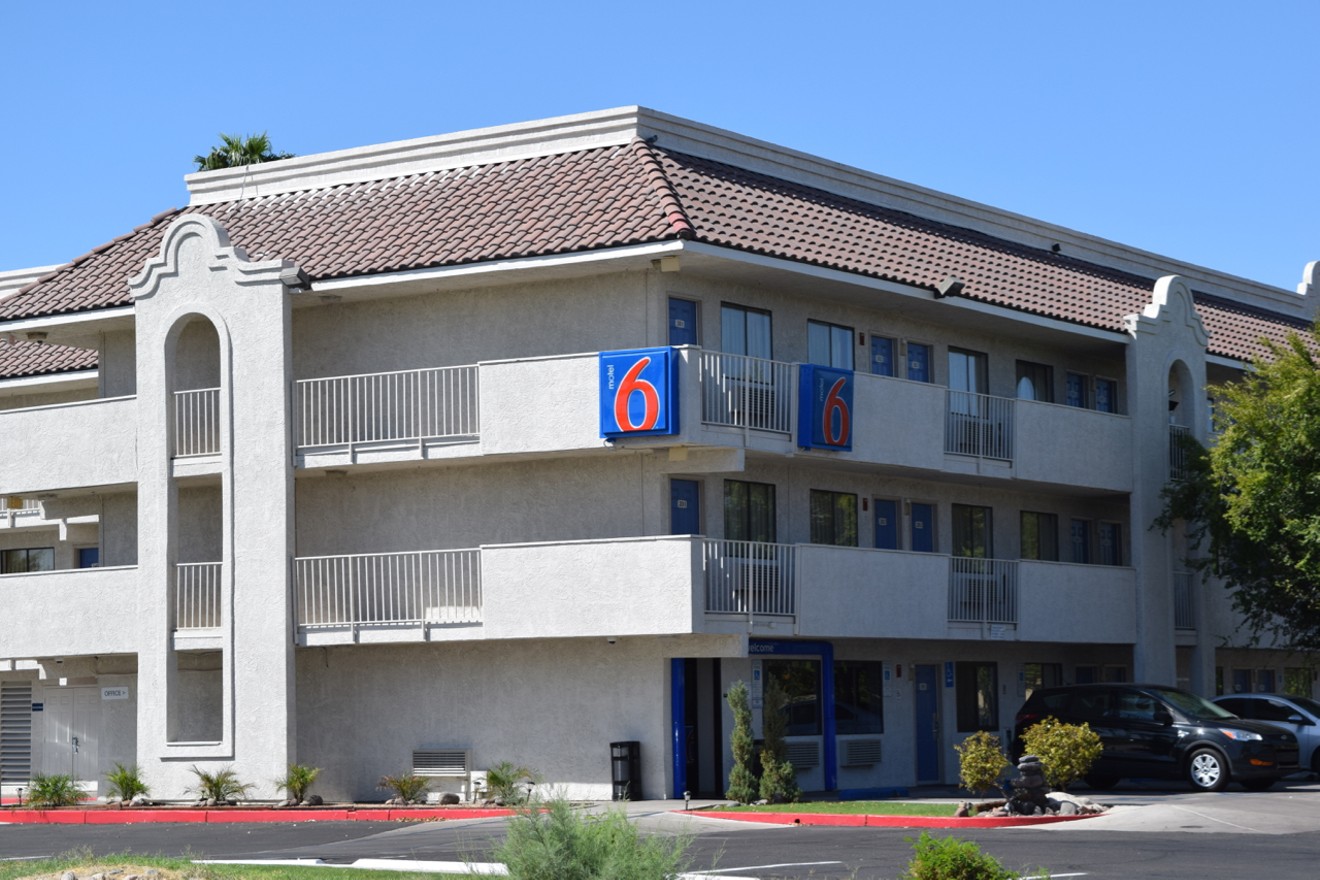A federal judge overseeing the settlement between Motel 6 and a Latino civil rights group said he needs more information on the number of guests who may have been affected by the budget chain’s practice of giving guest lists to immigration authorities.
The questions from Arizona U.S. District Judge David G. Campbell at a hearing in federal court on Tuesday underscore the difficulty of achieving a settlement for a far-flung group of people who were questioned and detained by immigration officers after they stayed at Motel 6 locations.
During the hearing, an attorney for Motel 6 acknowledged that tens of thousands of guests' information was turned over to immigration authorities. However, data on Motel 6 guests who were questioned by ICE or deported is in the hands of the federal government, the attorney said – if such data even exists.
Last year, the Mexican American Legal Defense and Educational Fund (MALDEF), a California-based Latino legal advocacy group, filed a class-action lawsuit against the budget motel chain after Phoenix New Times reporting revealed two Motel 6 locations in Phoenix were providing guest lists to Immigration and Customs Enforcement, leading to the frequent arrest of undocumented guests.
MALDEF and Motel 6 reached a settlement last summer, and filed the proposal for the court's approval in November. During Tuesday's hearing, the judge said he needs more specifics before he grants preliminary approval.
In the proposed settlement, Motel 6 agreed to pay up to $7.6 million to three classes of people affected by the company’s collaboration with ICE: guests whose information was given to immigration authorities, guests who were questioned by the authorities, and guests who were placed in deportation proceedings.
The company also agreed to pay $300,000 in legal fees for the plaintiffs, plus $1 million to administer the settlement. Any unclaimed funds will be donated to immigrant-rights and educational organizations, including the Arizona-based Florence Immigrant and Refugee Rights Project.
A two-year consent decree is meant to ensure that Motel 6 does not share guest information with immigration authorities, absent a warrant or subpoena.
The settlement spells out how the $7.6 million will be distributed. Guests whose information was provided to immigration authorities will receive $50. Guests who were questioned by ICE will receive $1,000. The largest monetary awards – at least $7,500, and possibly more depending on the circumstances – will go to guests placed in removal proceedings because Motel 6 gave their information to ICE.
But during the hearing on Tuesday in Phoenix, Campbell presented attorneys with difficult questions on how they can quantify the number of the affected guests who may have been caught up in the Motel 6-ICE dragnet. In order to certify the class, Campbell said he needed to know whether the settlement meets certain criteria, namely the “numerosity” of the affected classes.
Based on the proposed settlement agreement, Campbell said he doesn’t know if the people ICE questioned or placed in deportation proceedings number in the single digits, or an order of magnitude larger.
Attorneys for Motel 6 believe that the information of thousands of guests was given to immigration authorities. So, according to the proposed settlement, it's reasonable to conclude that the number of people who were questioned or placed in deportation proceedings is similarly large.
Nonetheless, the judge didn’t seem convinced by the proposed settlement's language. “I don’t have any idea” if a small group of people were questioned by ICE or placed in removal proceedings, or whether the number of affected guests is very large, Campbell said.
And in order to determine whether the class members received adequate representation, Campbell said he needs more information on their circumstances – “on who these people are.” The eight Latino plaintiffs represented by MALDEF in the lawsuit are anonymous.
Among Campbell’s most serious concerns is how the claims administrator overseeing the settlement will determine how much money each guest placed into deportation proceedings will receive.
At a minimum, each person will receive $7,500, but the settlement lists factors that can influence how much money each may receive, such as whether the individual has children, whether he or she was arrested, and the length of detention. But the judge pointed out that the agreement does not say how each factor will be valued.
Campbell spoke at length, outlining his questions on the settlement. When he finished, Campbell deadpanned, “Those are the only issues I have,” prompting laughter from the attorneys.
Both sides consulted together outside of the courtroom for several minutes. When they returned, MALDEF president and general counsel Thomas Saenz told Campbell they can address all of the issues, except the number of people who were interrogated or placed in removal proceedings.
Motel 6 has guest list records for the class of people whose information was merely provided to the authorities, Saenz said, but the size of the other classes depends on what immigration officials did with information received from Motel 6.
“This is an unusual case in many different ways,” Saenz told the judge, “but this is certainly one of them.”
An attorney for Motel 6, Michael B. DeSanctis of the firm Munger, Tolles, and Olson, LLP, told the judge that while they know there are “tens of thousands” on the lists given to ICE, DeSanctis said they won’t know about the number of people who were questioned or placed into deportation proceedings until the guests respond to the notice of the class-action settlement.
MALDEF is not convinced that Motel 6’s estimate of tens of thousands represents the full scope of affected guests, Saenz told reporters after the hearing.
Campbell reiterated that the burden is on the plaintiffs to prove the numerosity of the class, and said there needs to be a stated reason beyond “common sense.”
Saenz said the two sides would need two months to provide the court with new filings, and the judge scheduled another hearing for April 16.
“Obviously, I would be lying if I didn’t tell you I wish we got out of here with preliminary approval,” Saenz told reporters outside of the courtroom. “But I don’t think that what’s been put in front of us is insurmountable, and we’ll be ready to move forward with a settlement, I think.”
He said that the biggest challenge for the two sides is to explain why they believe the groups of people who came in contact with ICE are numerous, based on what they know and what Motel 6 knows.
“ICE certainly – as Motel 6’s counsel indicated – does not report back to Motel 6 about what they did with the information that they received,” Saenz said.
[
{
"name": "Air - MediumRectangle - Inline Content - Mobile Display Size",
"component": "18478561",
"insertPoint": "2",
"requiredCountToDisplay": "2"
},{
"name": "Editor Picks",
"component": "16759093",
"insertPoint": "4",
"requiredCountToDisplay": "1"
},{
"name": "Inline Links",
"component": "17980324",
"insertPoint": "8th",
"startingPoint": 8,
"requiredCountToDisplay": "7",
"maxInsertions": 25
},{
"name": "Air - MediumRectangle - Combo - Inline Content",
"component": "16759092",
"insertPoint": "8th",
"startingPoint": 8,
"requiredCountToDisplay": "7",
"maxInsertions": 25
},{
"name": "Inline Links",
"component": "17980324",
"insertPoint": "8th",
"startingPoint": 12,
"requiredCountToDisplay": "11",
"maxInsertions": 24
},{
"name": "Air - Leaderboard Tower - Combo - Inline Content",
"component": "16759094",
"insertPoint": "8th",
"startingPoint": 12,
"requiredCountToDisplay": "11",
"maxInsertions": 24
}
]












